语法专项突破系列 2
(学案)语法专项突破专题二第二讲 形容词和副词Word版含解析(1)
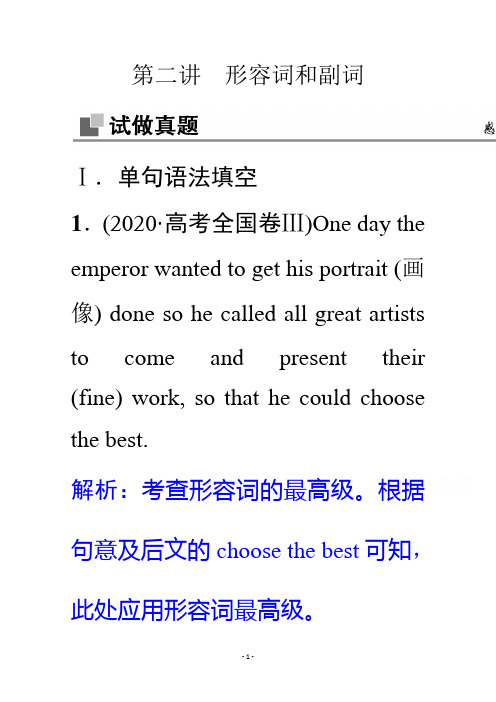
第二讲形容词和副词Ⅰ.单句语法填空1.(2020·高考全国卷Ⅲ)One day the emperor wanted to get his portrait (画像) done so he called all great artists to come and present their (fine) work, so that he could choose the best.解析:考查形容词的最高级。
根据句意及后文的choose the best可知,此处应用形容词最高级。
答案:finest2.(2020·新高考全国卷Ⅱ)At the same time,computer games are becoming increasingly popular as major publishing houses continue to develop (education) computer programs for children in preschool.解析:考查词性转换。
句意:与此同时,电脑游戏越来越受欢迎,大型的出版社继续为学前儿童开发教育电脑程序。
修饰名词computerprograms,应用形容词。
故填educational。
答案:educational3.(2019·高考全国卷Ⅰ)It is difficult to figure out a global population of polar bears as much of the range has been (poor) studied;however,biologists calculate that there are about 20,000-25,000 polar bears worldwide.解析:考查词性转换。
句意:由于对北极熊活动范围的研究甚少,很难计算出全球北极熊的数量,然而生物学家计算出全世界大约有两万到两万五千头北极熊。
语法专项突破 专题二 需要“变形”的名词、数词、形容词和副词 第3讲 词性转化(构词法) 含答案
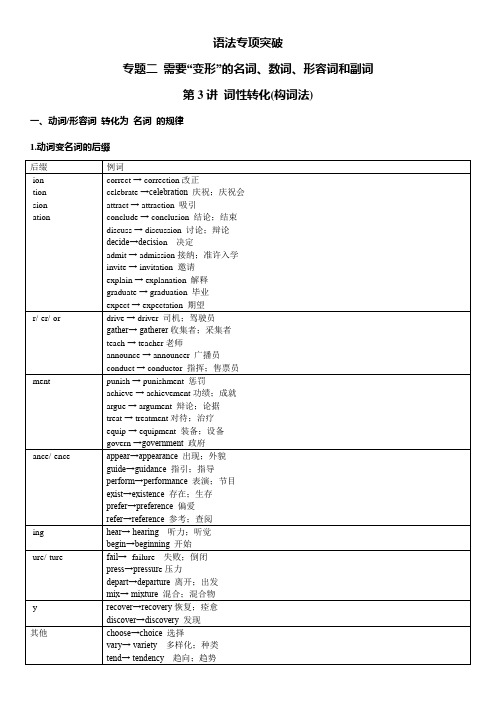
语法专项突破专题二需要“变形”的名词、数词、形容词和副词第3讲词性转化(构词法)一、动词/形容词转化为名词的规律1.动词变名词的后缀2.形容词变名词的后缀二、名词/动词转化为形容词的规律三、形容词转化为副词的规律❖厘清两种情况,突破词性转化❖一、从句法功用上看,厘清“修饰”与“被修饰”1.名词在句中做宾语,被冠词或形容词或形容词性物主代词所修饰。
[例1] She is determined to carry on with her __________(educate).[例2] Some people think that the great Chinese scholar Confucius, who lived from roughly 551 to 479 BC, influenced the __________(develop) of chopsticks.2.形容词在句中做定语,常放在名词之前[例3]It was a relief and I came to a _________(suddenly) stop just in the middle of the road.3.形容词在句中作表语,常放在be, get, become, remain等系动词后[例4]At one time, I even felt my parents couldn’t understand me so I hoped I could be _________(freely) from them.4.形容词在句中作宾语补足语,之前常有使役动词、感官动词或介词with加名词或代词[例5] As I walked, I looked up, trying to realize what made this day so ___________(beauty).5.副词在句中修饰动词[例6]The title will be _________(official) given to me at a ceremony in London.6.副词在句中修饰形容词或其他副词[例7]Dad and I were __________(terrible) worried.7.副词用在句首,修饰整个句子,表示状态、原因等。
无提示词型2024年高考英语语法填空题型全面解读与专项突破(2)
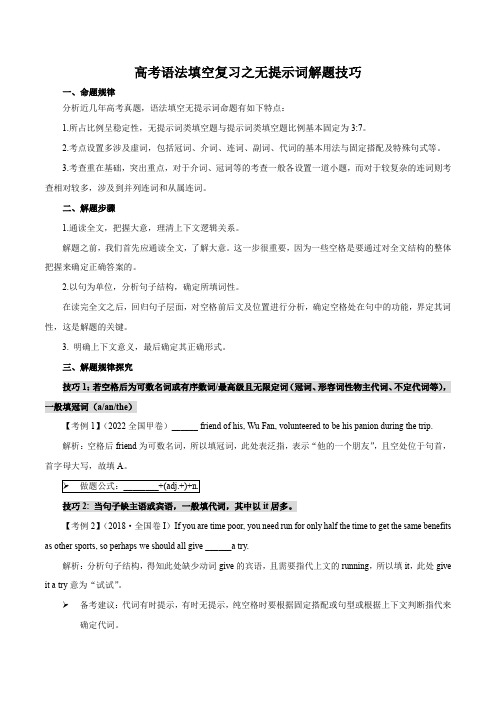
高考语法填空复习之无提示词解题技巧一、命题规律分析近几年高考真题,语法填空无提示词命题有如下特点:1.所占比例呈稳定性,无提示词类填空题与提示词类填空题比例基本固定为3:7。
2.考点设置多涉及虚词,包括冠词、介词、连词、副词、代词的基本用法与固定搭配及特殊句式等。
3.考查重在基础,突出重点,对于介词、冠词等的考查一般各设置一道小题,而对于较复杂的连词则考查相对较多,涉及到并列连词和从属连词。
二、解题步骤1.通读全文,把握大意,理清上下文逻辑关系。
解题之前,我们首先应通读全文,了解大意。
这一步很重要,因为一些空格是要通过对全文结构的整体把握来确定正确答案的。
2.以句为单位,分析句子结构,确定所填词性。
在读完全文之后,回归句子层面,对空格前后文及位置进行分析,确定空格处在句中的功能,界定其词性,这是解题的关键。
3. 明确上下文意义,最后确定其正确形式。
三、解题规律探究技巧1:若空格后为可数名词或有序数词/最高级且无限定词(冠词、形容词性物主代词、不定代词等),一般填冠词(a/an/the)【考例1】(2022全国甲卷)______ friend of his, Wu Fan, volunteered to be his panion during the trip.解析:空格后friend为可数名词,所以填冠词,此处表泛指,表示“他的一个朋友”,且空处位于句首,首字母大写,故填A。
技巧2: 当句子缺主语或宾语,一般填代词,其中以it居多。
【考例2】(2018·全国卷I)If you are time poor, you need run for only half the time to get the same benefits as other sports, so perhaps we should all give ______a try.解析:分析句子结构,得知此处缺少动词give的宾语,且需要指代上文的running,所以填it,此处give it a try意为“试试”。
中考英语 第二部分 专题语法 高效突破 专项2 名词课件

气派的近义词高贵气派,这是一个精致而充满风格的名词,几乎每个人都在追求它。
我们都熟悉这个词,它带给我们的是无穷的魅力,让我们想要体验这份高雅。
然而,仔细挖掘一下,其实我们对这个名词的理解有很多种,而它的含义也有很多不同的说法,比如:淡雅、高雅、典雅、文雅、贵气、优雅、尊贵、高贵、卓越、精致、高尚、高贵气派等。
这些词汇中都包含着某种美好和高雅的味道,但它们之间又有着微妙的差异。
淡雅,指的是温婉、清新、不张扬的一种气质,代表的是一种隐忍的优雅和诗意的洗礼。
它既气质温文,又兼具柔和的勇气,让人们在欣赏时可以从中得到放松和安宁的感受。
高雅,指的是一种端庄、优雅的气质,它更多的是强调一种体面和高尚,让人在面对它时更加尊重和佩服。
它让主人骄傲而自信,在欣赏时可以体会到一种恢弘的氛围。
典雅,隐喻着一种博学而精致的气质,它更多的强调的是一种高贵和厚重,让人在欣赏时有种高贵而有品位的感觉。
它让主人既有文化底蕴,又拥有正确的价值观,不论是社交还是艺术,都能够让人体现出典雅的品味。
文雅,意味着一种优雅的理念,它更多的强调的是一种文明、斯文和谦虚的素养,代表的是一种严谨而礼貌的品味。
它让主人不仅有文化修养,而且拥有自律和内涵,在做任何事情时,都能够拥有一种文雅的优雅。
贵气,指的是一种高贵、华丽的气质,它更多的强调的是一种落落大方、不矫揉造作的气度,表现出一种高贵而张扬的品质。
它让主人在欣赏时有着一种贵族气质和豪气,无论是从衣着到行为,都会体现出一种贵气。
优雅,指的是一种精致、妩媚的气质,它更多的强调的是一种女性气质,表现出一种带有柔情似水的温柔。
它让主人在欣赏时有着一种斯文、精致、优雅和典雅的感觉,而且更淡雅、更真诚。
尊贵,指的是一种高贵、庄严的气质,它代表的是一种尊重和敬意,让人在面对它时可以感受到尊贵而肃穆的气氛。
它让主人即使是在社交中,也能够坚持自己的原则,一贯以尊严的态度见人,做到礼贤下士的派头。
高贵,是一种无论人们如何描述它都难以拒绝的气质,它代表的是一种高贵而伟大的荣誉,让人在面对它时可以感受到无比的尊敬及自豪感。
专题02 名词-备战中考英语专项突破课件(语法篇)

foot→feet;tooth→teeth; 改变内部元音字母
man→men; mouse→mice
特殊名词 词尾加-ren 单复数同形
child→children sheep→sheep;deer→deer; Chinese→Chinese
“各国人”名 词变复数
Chinese→Chinese;
—Because the color red is the
of good luck in China.
A.reason
B.hope
C.dream
D.symbol
( C )12.(2020·武汉)—How's Mr.Clark's small company?
—Quite good . It has grown to become a
—Hard to believe! Scientists are full of great changes in our life.
which leads to
A.attraction
B.invention
C.position
D.contribution
( A )3.(2020·福建)—I like
light(光;光线)—a light(电灯) orange(橙汁)—an orange(橙子) radio(无线电)—a radio(收音机) fish(鱼肉)—fishes(各种各样的鱼) exercise(锻炼;运动)—exercises(习题) life(生活)—lives(生命) time(时间)—times(倍;次数)
教材单元链 语法项目 考查角度
接
教材例句
When is Alice'birthday?
2020版 创新设计 高考总复习 英语 (外研版)第二部分 语法专项突破第二部分 专题一 第一讲 谓语动词
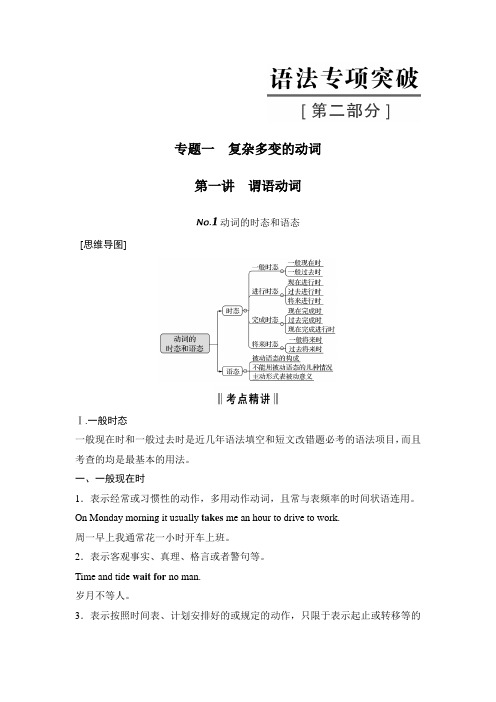
专题一复杂多变的动词第一讲谓语动词动词的时态和语态[思维导图]Ⅰ.一般时态一般现在时和一般过去时是近几年语法填空和短文改错题必考的语法项目,而且考查的均是最基本的用法。
一、一般现在时1.表示经常或习惯性的动作,多用动作动词,且常与表频率的时间状语连用。
On Monday morning it usually takes me an hour to drive to work.周一早上我通常花一小时开车上班。
2.表示客观事实、真理、格言或者警句等。
Time and tide wait for no man.岁月不等人。
3.表示按照时间表、计划安排好的或规定的动作,只限于表示起止或转移等的动词如come,go,leave,arrive,fly,return,start,begin,open,close,end,stop等。
The shop closes at 11:00 p.m.every day.商店每天晚上11点关门。
Tomorrow is Wednesday.明天是星期三。
4.在时间、条件状语从句中常用一般现在时代替将来时。
I’ll write to her when I have time.有时间我会写信给她。
二、一般过去时1.表示过去某个时间发生的动作或存在的状态,常与表示过去的具体时间状语连用(或有上下文语境暗示);也可用于表达过去的习惯。
We met her in the street yesterday.我们昨天在街上遇见她了。
When he was young,he took cold baths regularly.他年轻时经常洗凉水澡。
I didn’t expect to see you studying at the library.我没料到会看见你在图书馆学习。
2.在时间、条件、让步状语从句中,若主句用了过去将来时,从句常用一般过去时表示过去将来的意义。
He said he would tell her about the news as soon as he met her.他说他一见到她就把这个消息告诉她。
语法专项突破二语法专练知能闯关
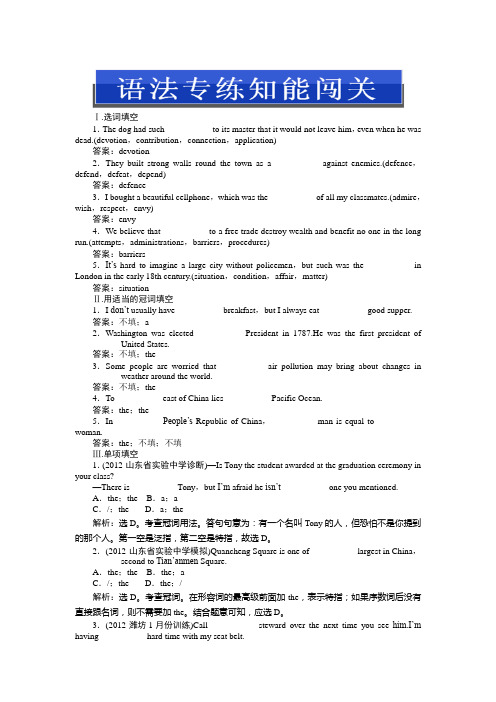
Ⅰ.选词填空1.The dog had such __________ to its master that it would not leave him,even when he was dead.(devotion,contribution,connection,application)答案:devotion2.They built strong walls round the town as a __________ against enemies.(defence,defend,defeat,depend)答案:defence3.I bought a beautiful cellphone,which was the __________ of all my classmates.(admire,wish,respect,envy)答案:envy4.We believe that __________ to a free trade destroy wealth and benefit no one in the long run.(attempts,administrations,barriers,procedures)答案:barriers5.It’s hard to imagine a large city without policemen,but such was the __________ in London in the early 18th century.(situation,condition,affair,matter)答案:situationⅡ.用适当的冠词填空1.I don’t usually have __________ breakfast,but I always eat __________ good supper.答案:不填;a2.Washington was elected __________ President in 1787.He was the first president of __________ United States.答案:不填;the3.Some people are worried that __________ air pollution may bring about changes in __________ weather around the world.答案:不填;the4.To __________ east of China lies __________ Pacific Ocean.答案:the;the5.In __________ People’s Republic of China,__________ man is equal to __________ woman.答案:the;不填;不填Ⅲ.单项填空1.(2012·山东省实验中学诊断)—Is Tony the student awarded at the graduation ceremony in your class?—There is __________ Tony,but I’m afraid he isn’t __________ one you mentioned.A.the;the B.a;aC./;the D.a;the解析:选D。
高考英语语法词汇专项突破:02情态动词用法考点扫描+巩固练习+答案
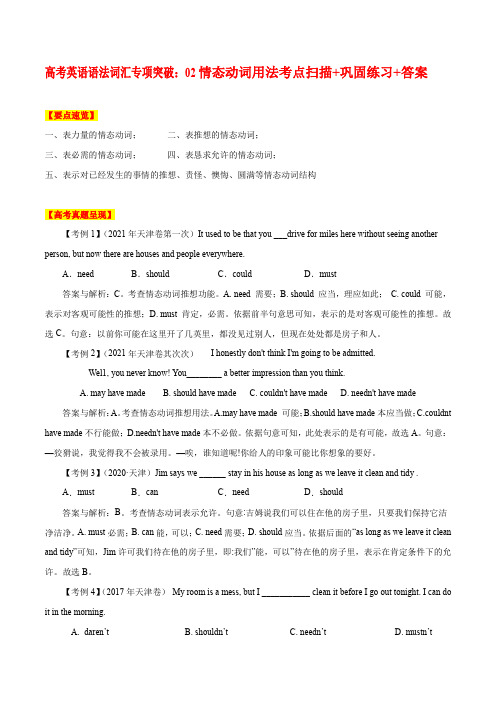
高考英语语法词汇专项突破:02情态动词用法考点扫描+巩固练习+答案【要点速览】一、表力量的情态动词;二、表推想的情态动词;三、表必需的情态动词;四、表恳求允许的情态动词;五、表示对已经发生的事情的推想、责怪、懊悔、圆满等情态动词结构【高考真题呈现】【考例1】(2021年天津卷第一次)It used to be that you ___drive for miles here without seeing another person, but now there are houses and people everywhere.A.need B.should C.could D.must答案与解析:C。
考查情态动词推想功能。
A. need 需要;B. should 应当,理应如此;C. could 可能,表示对客观可能性的推想;D. must 肯定,必需。
依据前半句意思可知,表示的是对客观可能性的推想。
故选C。
句意:以前你可能在这里开了几英里,都没见过别人,但现在处处都是房子和人。
【考例2】(2021年天津卷其次次)---I honestly don't think I'm going to be admitted.---Wel1, you never know! You________ a better impression than you think.A. may have madeB. should have madeC. couldn't have madeD. needn't have made答案与解析:A。
考查情态动词推想用法。
A.may have made 可能;B.should have made本应当做;C.couldnt have made不行能做;D.needn't have made本不必做。
依据句意可知,此处表示的是有可能,故选A。
- 1、下载文档前请自行甄别文档内容的完整性,平台不提供额外的编辑、内容补充、找答案等附加服务。
- 2、"仅部分预览"的文档,不可在线预览部分如存在完整性等问题,可反馈申请退款(可完整预览的文档不适用该条件!)。
- 3、如文档侵犯您的权益,请联系客服反馈,我们会尽快为您处理(人工客服工作时间:9:00-18:30)。
【典题印证】选词填空(whoever/wherever/whatever) (2012· 山东高考)When you are done with the book, just give it to Lucy or Helen or .
解题关键: 由题干中的关键信息give it to Lucy or Helen可知空格处应 选与Lucy or Helen平行的成分, 故只能选表示人的whoever, 意为“无 论谁, „„的任何人”, 构成give sth. to sb. 结构。whatever虽然可作
at
介
词
用
法
in
①表方位, 在某范围内, 特别注意在报纸上、书上有什 么内容, 要用in ②表时间, 后接表时间段的名词短语, 指在某一段时间 内或在带有将来时态的语句中表示某一段时间将发生 句子谓语动词所表示的动作 ③表示材料、语言、方式、声音
介
词
用
法
on
①表示时间, 指在特定的某一天(的上午、下午或晚上) 或一星期的某一天。注意in the morning与on the morning of 1st, May的区别 ②表示方位, 指在某一事物表面上或与某物毗邻 ③表示与某一方面内容相关, 意为“关于” ④与名词或动名词连用, 意为“一„„就„„”, 如On arriving in Beijing, I called him. 表示“来自”或“从„„时间开始”
物”, 强调整体, 与not连用时表示部分否定, 意为“并不是所有事物 都„„”。
3. none, no one/nobody, nothing的用法 指 none no one/nobody nothing 代 回 答 特/泛指 特 泛 泛 指 指 指
人或物 指 指 人 物
how many/much who what
appreciate, depend on, rely on, count on等。
I hate it when people talk with their mouths full. 我讨厌人说话时嘴里含着食物。
【典题印证】完成句子 (2014· 陕西高考)I’d or not you will come. 如果你能提前让我知道你是否会来, 我将很感激。 you could let me know in advance whether
考点3 不定代词的用法
★★
1. both, all, either, any, neither, none的用法
都 两 者 both all 任 一 都 不
either any
neither none
三者或三者以上
2. something, anything, nothing的用法
句
something
换成those; (3)that指代物, 不指代人(定语从句中除外), one可指代人或
物; (4)要归类记忆(指代人或物, 可数不可数等)。
【典题印证】选词填空(it/this/one)
(2014· 浙江高考)An average of just 18. 75 cm of rain fell last year,
it was a vacation. Some of my friends who had been there before said __ wonderful holiday destination.
it stay in the air for seconds. 3. (2014· 辽宁高考)Raise your leg and let __
【点津】这类引导词可用于引导名词性从句且均可换成“先行词+关
系代词+定语从句”, 没有疑问意味; 而没有ever的引导词, 如which,
who等却含有疑问意味。 Whoever(=Anyone who)comes will be welcome. 任何人来都欢迎。 Who will come isn’t known now. 谁会来现在还不知道。
【点津】no one无任何人, nothing无任何物, none无任何上文提到的
人或物。
【典题印证】用适当的代词填空
(2014· 江西高考)—When shall I call, in the morning or afternoon?
— . I’ll be in all day.
解题关键: 根据文中提到的in the morning or afternoon可知, 此处指在 两者之间作出选择, 又根据“I’ll be in all day. ”可知应该是两个时间 段均可以。故填Either。
代词, 但表示的是事物, 意为“无论什么”; wherever“无论哪里”为
副词, 在题意与结构上都不符合。
【高考集训】
用适当的代词填空
1. (2014· 新课标全国卷Ⅱ)Then the driver stood up and asked, “Did anyone lose a suitcase at the last stop? ”A woman on the bus shouted, me/mine (I). ”She pushed her way to the driver and “Oh dear! It’s ________ took the suitcase thankfully. 2. (2014· 广东高考)Last year, my brother and I went to Miami for a
making the driest year since California became a state in 1850.
解题关键: 由语境可知, 此处考查的是代词的替代法, 替代前面提到的 last year, 为同名同物的指代, 用it。this这个; one一个, 泛指“同类当 中的一个”。
考点4 疑问代词+-ever的用法
★
疑问代词主要考查: whatever=any or every(thing)that. . . 任何或
每一样事物; whichever =the person or thing that. . . „„的那个人或 物 ; whoever=anyone who. . . „„的任何人 ; whomever =anyone whom. . . „„的那个人或任何人
4. (2014· 四川高考)She’d lived in London and Manchester, but she neither and moved to Cambridge. liked _______ It is the milkman. 5. (2014· 大纲版全国卷)—Who’s that at the door? —__ 6. (2013· 陕西高考)Although Rosemary had suffered from a serious none of her enthusiasm for life. illness for years, she lost _____
★★★ 特/泛指 特 泛 特 泛 指 指 指 指
类
型
代替内容 the+同类异物名词复数 the+同类异物名词单数或不 可数名词 the+同类异物名词复数
特/泛指 特 指
the onesຫໍສະໝຸດ thatthose
特
特
指
指
注意: (1)the one有后置定语时可换成that; (2)the ones有后置定语时可
strange+that从句”中, 从句的谓语动词常用“should+动词原形”, 且 should可以省略。 It’s necessary and important that one should master the skills of operating computers.
掌握电脑操作技术有必要且很重要。
你换一下工作是有必要的。
②It+be+adj. +of sb. to do sth. 此句型中的形容词描述的是人的品德、 特 征 。 能 用 于 该 句 型 的 形 容 词 有 : kind, nice, wise, silly, polite, impolite, friendly, foolish, clever等。
④It+be+adj. /n. +doing sth. 用于此句型的形容词和名词(短语)常见的
有: no/little use, no/much good, useless, fun等。 It’s no use crying over spilt milk. 后悔无益, 于事无补。
⑤It+be+n. /adj. +主语从句。在“It is natural/necessary/important/
How silly it was of you to give up such a good chance!
你放弃这样一个好机会是多么傻啊! ③It+be+n. (+for sb. /sth. )+to do sth. 用于此句型的名词(短语)有: pity, shame, pleasure, fun, joy, good manners, bad manners等。 It is bad manners for the young to take up the seats for the old. 年轻人占据老人的座位是不礼貌的。
语法专项突破系列 2. 代词、介词和介词短语
代
考点1 it的用法 ★★★★★
词
it常作形式主语(宾语), 替代动词不定式、动名词或者名词性从句。 1. it作形式主语的句型 ① It+be+adj. +(for sb. )to do sth. 常 用 于 此 句 型 的 形 容 词 : easy, difficult, hard, necessary, unnecessary, possible等。 It is necessary to change your job.
